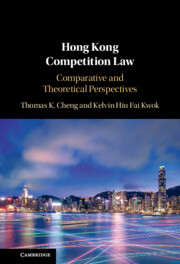Book contents
- Hong Kong Competition Law
- Hong Kong Competition Law
- Copyright page
- Contents
- Preface
- Acknowledgements
- Foreword
- Table of Cases
- Table of Legislation
- Table of Guidelines and Policy Documents
- Abbreviations
- 1 Introduction
- 2 First Conduct Rule
- 3 Second Conduct Rule
- 4 Exclusions and Exemptions
- 5 Enforcement and Procedure
- 6 Conclusion
- References
- Index
1 - Introduction
Published online by Cambridge University Press: 13 October 2021
- Hong Kong Competition Law
- Hong Kong Competition Law
- Copyright page
- Contents
- Preface
- Acknowledgements
- Foreword
- Table of Cases
- Table of Legislation
- Table of Guidelines and Policy Documents
- Abbreviations
- 1 Introduction
- 2 First Conduct Rule
- 3 Second Conduct Rule
- 4 Exclusions and Exemptions
- 5 Enforcement and Procedure
- 6 Conclusion
- References
- Index
Summary
About eight years after the passage of the Competition Ordinance1 (the Ordinance) and five years after it came into effect, it is easy to forget how remarkable the journey has been for the adoption of competition law in Hong Kong. Since the early 1990s, when the Consumer Council, a quasi-governmental consumer protection body, began advocating for a competition law in Hong Kong, the Hong Kong government had strenuously resisted calls for competition legislation on the ground that the city’s economy was already highly competitive due to its openness to external trade . The lack of trade barriers meant that any firm could enter the city’s markets easily and discipline the existing market players. The ease of market entry would keep the exercise of market power to a minimum. The fallacy of this argument is easy to see. While the lack of trade barriers may allow competition in the markets for tradeable goods, it has no bearing on the degree of competition for non-tradeable services. Openness to trade would not save the domestic market from a monopolistic retailer, for example.
- Type
- Chapter
- Information
- Hong Kong Competition LawComparative and Theoretical Perspectives, pp. 1 - 23Publisher: Cambridge University PressPrint publication year: 2021



